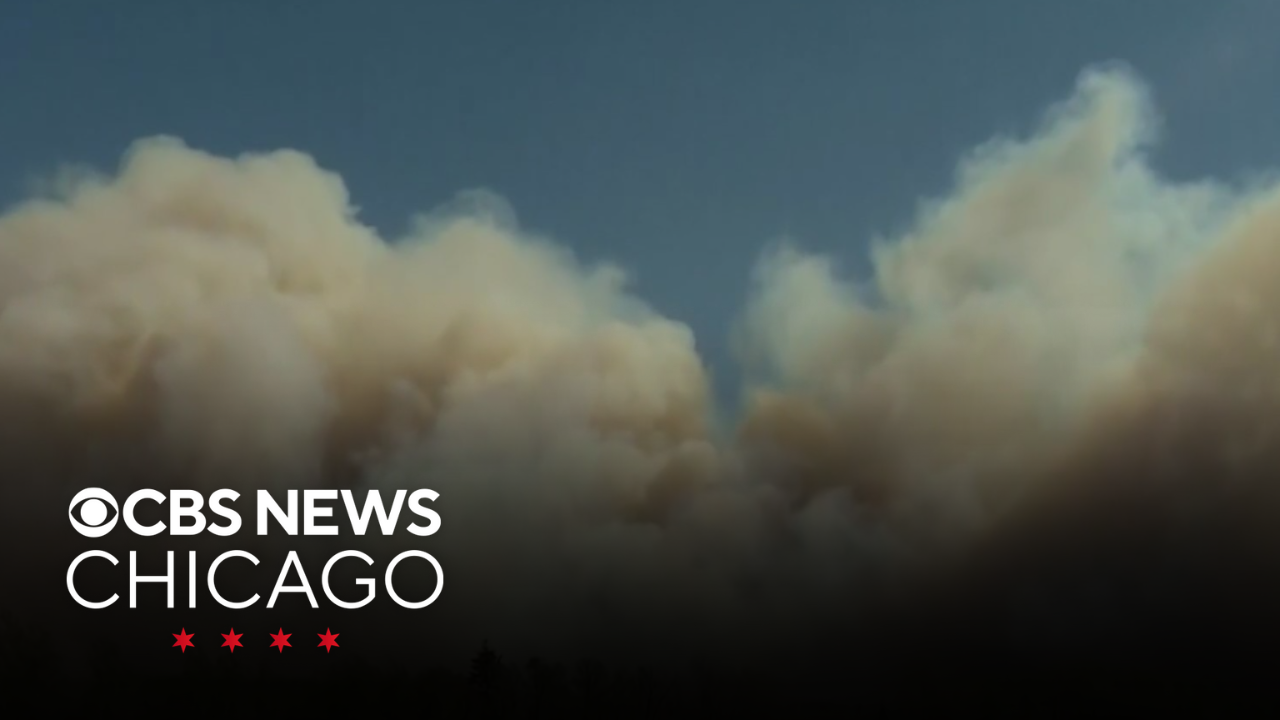Wildfires in Manitoba, Canada, to send smoke into Chicago area starting Friday
/ CBS Chicago
Wildfire smoke from Manitoba, Canada, heading to Chicago

Leaders in the Canadian Province of Manitoba have issued a state of emergency as wildfires continue to rage there, forcing thousands of people to evacuate.
The inferno will impact the Chicago area too, with smoke descending downtown as soon as Friday.
As anyone who was around two years ago will remember, this is not the first time a hazy, unhealthy back of air engulfed and choked Chicago.
The fire is more than 1,300 miles away — almost a 24-hour drive — and in a different country. But CBS News Chicago Meteorologist David Yeomans explained why the smoke from what is burning in Manitoba will be down Chicago's way very soon.
In short, all the air will be flowing right toward Chicago from Canada.
"[The] northwest wind going to drive the smoke right into our area," Yeomans said, "possibly for three days."
Smoky Chicago skies caused major health concerns multiple times in the summer of 2023. The city made national headlines in late June for having the worst air quality in the world.
COn one June day, several places in Cook County registered an AQI, or air quality index, of above 200 — considered "very unhealthy" by the Environmental Protection Agency. At one point on Tuesday, June 27, Chicago was at level 228.
Beaches were closed and events were canceled around the Chicago area due to the smoke in the air that month.
The Illinois Environmental Protection Agency does not expect this weekend's smoke infiltration to be as dangerous as June 2023, and there are no plans for an Air Pollution Action Day as was issued then.
But Loyola Medicine pulmonologist Dr. Sean Forsythe wants everyone to remain alert nevertheless.
"Air pollution isn't healthy for anyone," Forsythe said.
When a wall of dust descended on Chicago during a rare dust storm on Friday, May 16, Dr. Forsythe's phone didn't stop ringing.
"More asthma patients were having problems," he said.
Forsythe expects another influx of calls this weekend when the smoke settles in the Chicago area.
"The smaller particulates can penetrate deeper into the lungs and get absorbed into the bloodstream, and so those are the ones that start to raise the risk of strokes, heart attacks," Forsythe said.
Forsythe said even moderate levels of smoke will make people cough of experience shortness of breath.
"It will raise risk of lung disease being exacerbated, and everybody might not feel great when they're out in that weather," he said.
Forsythe explained why people exercising outdoors, including those running in the Bank of America Chicago 13.1 half marathon on Sunday, might especially feel the effects.
"You tend to breathe deeper and faster, and so you're getting more exposure to that particulate matter," he said.
Why are wildfires impacting our neighbors to the north, and Chicago, again? It has to do with climate change.
"Warmer temperatures dry out the vegetation more, right? And temperatures in that area have been 10 to 20 degrees warmer than normal," Yeomans said. "Our partners at Climate Central have found this is reaching a climate shift index of 5 — in other words, this is an exceptional climate change-driven event, made at least five times more likely by climate change."
Half-marathon organizers said their forecasting shows conditions for the race this weekend will be "green," or ideal. They plan to monitor air quality closely and will provide updates if anything changes.
Lauren Victory is a Morning Insider reporter for CBS2 Chicago. Lauren joined the station in May 2016 and is a graduate of the Medill School of Journalism at Northwestern University.








